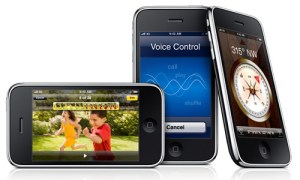 iPhone users in the United States wanting to place calls via Voice-over-Internet-Protocol (VoIP) services like Skype have been forced to stick to the ghettos of Wi-Fi hotspots in order to place their low-cost calls…but AT&T finally says its network has the capacity to support VoIP on the iPhone, so users will be able to place VoIP calls via AT&T’s 3G network. AT&T says it has let both Apple and the Federal Communications Commission know about its change in policy; now all Apple has to do is approve VoIP-over-3G apps for the iPhone.
iPhone users in the United States wanting to place calls via Voice-over-Internet-Protocol (VoIP) services like Skype have been forced to stick to the ghettos of Wi-Fi hotspots in order to place their low-cost calls…but AT&T finally says its network has the capacity to support VoIP on the iPhone, so users will be able to place VoIP calls via AT&T’s 3G network. AT&T says it has let both Apple and the Federal Communications Commission know about its change in policy; now all Apple has to do is approve VoIP-over-3G apps for the iPhone.
“iPhone is an innovative device that dramatically changed the game in wireless when it was introduced just two years ago,” said AT&T president and CEO Ralph de la Vega, in a statement. “Today’s decision was made after evaluating our customers’ expectations and use of the device compared to dozens of others we offer.”
AT&T says the decision to support VoIP-over-3G from iPhone users us the result of a regular review of features and capabilities the company performs to keep its services attractive to customers.
The timing of the review is interesting, coming well over a year after the introduction of the iPhone 3G and only two months after the FCC launched an inquiry into the rejection of Google Voice for the iPhone. In response to the FCC, it looks like Apple’s rejection of Google Voice was mainly due to replicating core dialing feature of the iPhone than anything to do with VoIP capabilities. However, as part of its response to the FCC query, AT&T revealed that part of the exclusivity agreement with Apple regarding the iPhone included Apple not approving any VoIP applications that use AT&T’s wireless data service without AT&T’s consent. AT&T has repeatedly cited network capacity concerns as a reason for not permitting VoIP apps to use its wireless data service; industry watchers have speculated AT&T’s strictures had more to do with making sure iPhone customers didn’t bypass AT&T’s calling services.
Skype president John Silverman lauded AT&T’s decision in a statement, but called on the FCC to implement policies that let consumers use services like Skype on any lawful device on any network.


